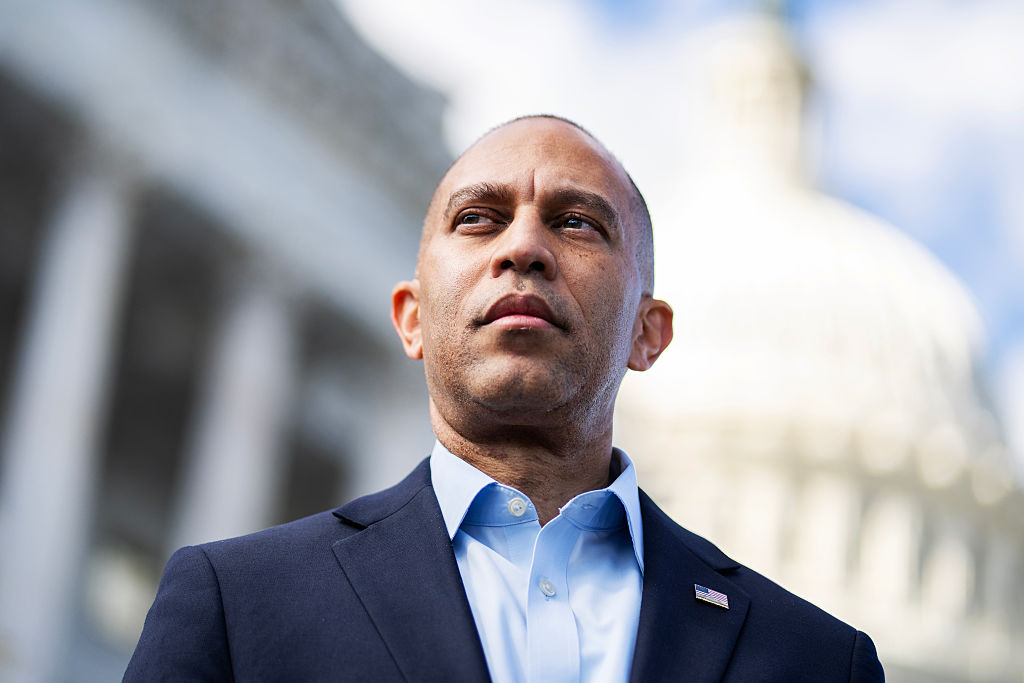Hakeem Jeffries Is Wrong About Many Things, But Redistricting Is Not One Of Them
Source: Tom Williams / Getty In a recent Zoom meeting with House Minority Leader Hakeem Jeffries, members of the Illinois Senate Black Caucus reminded him of one major obstacle in the ongoing congressional redistricting war between Democrats and Republicans: Black politicians unwilling to sacrifice their power and Black political power collectively for an alleged greater [...]


In a recent Zoom meeting with House Minority Leader Hakeem Jeffries, members of the Illinois Senate Black Caucus reminded him of one major obstacle in the ongoing congressional redistricting war between Democrats and Republicans: Black politicians unwilling to sacrifice their power and Black political power collectively for an alleged greater good.
This should have long been foreseen by Jeffries and other Democratic leaders, but it is never surprising for Democrats, even the Black ones, to ignore the concerns of Black folks often until it’s damn near too late – and the same goes for the mainstream press corps that covers them.
For months now, in addition to efforts led by California Governor Gavin Newsom, Jeffries has reportedly joined other national Democratic officials in pushing legislative leaders in the states of Illinois, Virginia, and Maryland to proceed with plans to redraw their maps to counter efforts in GOP-controlled states like Texas, North Carolina, and Missouri.
However, select members of those caucuses were said to have expressed serious reservations, if not flat-out declarations of refusal to sign on, rooted in the belief that the Democratic Party’s plans to block the GOP gerrymandering their way to total seizure of Congress would disproportionally harm Black lawmakers by dismantling their districts.
Then came the public warning to Jeffries from state Senator Willie Preston, chair of the Illinois Senate Black Caucus, who told a reporter the caucus won’t back any map that dilutes the Black vote in any historically Black district.
“We’re going to fight back,” Preston said. “We just won’t do so at the expense of our own power.”
Preston is running to replace Democratic Congresswoman Robin Kelly, who is running for Senate, in one of those districts.
It’s not hard to understand why Preston would be pressed about the potential chance of him going to Congress being eradicated for the benefit of some politician who will likely not bear the same shade as him or the majority of his potential constituents.
On Monday morning, House Minority Leader Hakeem Jeffries traveled to Illinois to meet with state Democratic lawmakers to urge them to consider a mid-decade redistricting, all the same.
While protecting Black representation is absolutely a legitimate concern, true power requires strategic sacrifice, and in the long term, real investment in states across the South.
As former Attorney General Eric Holder, who has worked with former President Barack Obama on nonpartisan map-drawing efforts in recent years, explained to the Washington Post recently, “We’re doing things that kind of go against what we talked about [because] we have to preserve our democracy if ultimately we’re going to heal it.”
Still, there is a real reason to worry about what the Democrats’ plans mean for Black political power writ large.
Former Ohio State Senator Nina Turner warned in August that if both parties engage in partisan redistricting battles, “Black Americans—split between 23 Republican-controlled states (44-45% of the Black population) and 15 Democratic ones (30%)—will see their collective political power diluted.”
The looming Supreme Court case, Louisiana v. Callais, where Supreme Court Justice John Roberts may finally achieve his decades-long crusade to kill the Voting Rights Act, only compounds these fears, as Democrats would be in danger of losing around a dozen majority-minority districts across the South.
But that ruling won’t affect the next midterms, and if Democrats retake the House, they can fight whatever terrible decision SCOTUS issues.
I question the logic of refusing to relinquish any power when that refusal renders your entire party powerless for a generation. What good is a safe seat in a permanent minority?
Furthermore, when it comes to the dilution of Black political power in the South, much as we can blame the GOP for gerrymandering, voter suppression efforts of every variety, and so on, we can also fault the Democrats for not even bothering to do much with the huge Black populations existing within the South.
For decades at that!
Have writers like me for years not complained about why the Democratic Party hasn’t invested in Black candidates in statewide races in places like Mississippi and North Carolina?
Have the candidates themselves, such as former Louisiana Senate candidate and activist Gary Chambers, not pointed out the flawed strategy of ignoring Black voters in the South?
Just recently, Chambers told Joy Reid: “There are a million Black folks in Mississippi — you only need 480,000 to show up to flip the state, which $25 million could accomplish.”’
“If Greg Abbott can spend $90 million on one county in Texas,” he argued, “Democrats can’t keep saying the South isn’t worth it.”
He is right to argue to Democrats, “If you’re not investing in Louisiana and Mississippi after all the losses everywhere else, you’re not serious about winning.”
I’m still old enough to remember a Democratic governor of Texas, and I strongly believe we can bolster Black political power by investing in states where Black people live and are moving to.
Given the direction of the next census and the maps that will be drawn thereafter in the coming years, this is the surest survivalist strategy for Democrats anyway.
As for what power that might be lost in the meantime, I suspect much of this is rooted in individual politicians and their fears of losing their personal political power, or, if nothing else, having to work a whole lot harder for it.
Most politicians of all parties enjoy gerrymandering because it makes it easier for them, and while such luxuries aren’t often afforded to Black people, I couldn’t care less about any Black politician ultimately pressed about their power at the expense of everyone else’s. It’s OK for members of the CBC who have had cushy seats for decades that have largely gone unchallenged to work a bit harder.
I don’t have a lot of faith in the charms of Hakeem Jeffries to convince those in doubt about all this, but for all the many-many-many-many political stances I disagree with him on, redistricting isn’t it.
This is a one-time opportunity to stop the Republicans – everyone has to suck it up.
Michael Arceneaux is a New York Times bestselling author whose most recent book, I Finally Bought Some Jordans, was published last March.
SEE ALSO:
Virginia Democrats Launch Surprise Redistricting Effort
North Carolina Lawmakers Announce Redistricting Effort
California Gov. Gavin Newsom Signs Bill Launching Redistricting Effort
Missouri Governor Mike Kehoe Sets Special Session For Redistricting
Share
What's Your Reaction?
 Like
0
Like
0
 Dislike
0
Dislike
0
 Love
0
Love
0
 Funny
0
Funny
0
 Angry
0
Angry
0
 Sad
0
Sad
0
 Wow
0
Wow
0














